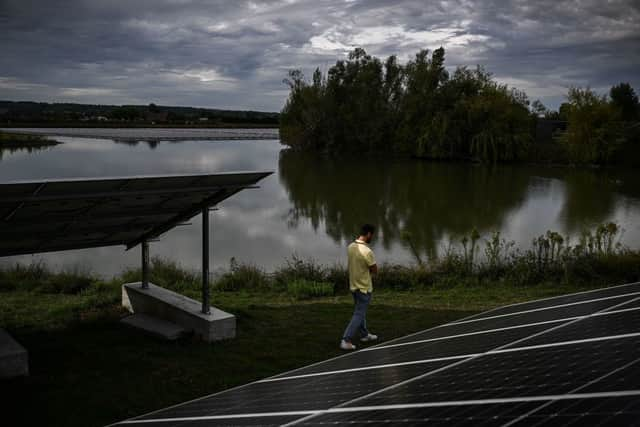Paris Agreement: still time to limit warming to 1.5C thanks to clean energy progress - but window shrinking
and live on Freeview channel 276
There's still time to keep the Paris Agreement alive thanks to a boom in clean energy, the International Energy Agency says, but the window has shrunk.
The IEA has released a new update to its 2021 net zero roadmap, which found world governments have managed to increase solar power capacity and electric car sales in line with what is needed to help limit average global temperatures increases to 1.5 degrees above pre-industrial levels - the point where climate scientists warn humans will have increasingly little control over how much temperatures continues to rise.
Advertisement
Hide AdAdvertisement
Hide AdAlmost every country on Earth signed up to the Paris Agreement in 2015 to limit global temperature rise to 1.5C - or 2C at the very most. However, the world has just had its hottest summer on record, with July and August both creeping over the 1.5C average mark.
The IEA update found solar polar and electric cars alone are set to provide a third of the emissions reductions between now and 2030. In its original report two years ago, it said new technologies not yet on the market would have to provide 50% of the emissions reductions needed, but this has now fallen to 35% – a testament to the speed renewable technologies have been developed.


However, its analysts said that bolder action was needed this decade to meet the 1.5C target and avoid the catastrophic consequences of climate breakdown - including a sharp rise in electric car and heat pump sales, and reducing methane use in the energy sector by 75%.
Clean energy investment would also need to more than double from the amount spent this year, from £1.5 trillion to £3.7 trillion worldwide.
Advertisement
Hide AdAdvertisement
Hide AdIEA executive director Fatih Birol told PA that keeping the goal of limiting global warming to 1.5C alive required the world to come together quickly. “The good news is we know what we need to do – and how to do it.
“But we also have a very clear message: strong international co-operation is crucial to success," he continued. "Governments need to separate climate from geopolitics, given the scale of the challenge at hand.”
It also issued a grave warning for world leaders who did not enact ambitious enough policies, saying that without them, achieving 1.5C would depend on as-of-yet unproven carbon removal technology removing five billion tonnes of carbon dioxide each year.
“Removing carbon from the atmosphere is very costly. We must do everything possible to stop putting it there in the first place," Dr Birol added. “The pathway to 1.5C has narrowed in the past two years, but clean energy technologies are keeping it open."
Advertisement
Hide AdAdvertisement
Hide AdThe IEA said no new oil, gas or coal projects were needed, though some investment would be required in those already been approved, with clean energy to replace fossil fuels - lowering their use 25% by 2030, and 80% by 2050.
This has drawn criticism from climate activists towards the UK government, with Prime Minister Rishi Sunak announcing at least 100 new oil and gas exploration licences would be granted for the North Sea, as well as softening a number of the UK's net zero policies, including a ban on new petrol and diesel cars.
Greenpeace UK’s senior climate campaigner Charlie Kronick said: “Sunak is not only out of touch with expert advice, but he’s completely at odds with the UK public who told us in our recent poll that they want more insulation, more renewable energy, and a proper windfall tax."
Rowing back on climate policies when the UK should be speeding them up will also leave us trailing behind other countries on the green economy, he said. “With the public, business leaders and world-leading energy experts all in agreement that climate rowbacks are a bad idea, it begs the question of whose advice Sunak is listening to. The only clear winners are the oil and gas companies, and the ideologues on his own backbenches.”
Comment Guidelines
National World encourages reader discussion on our stories. User feedback, insights and back-and-forth exchanges add a rich layer of context to reporting. Please review our Community Guidelines before commenting.
